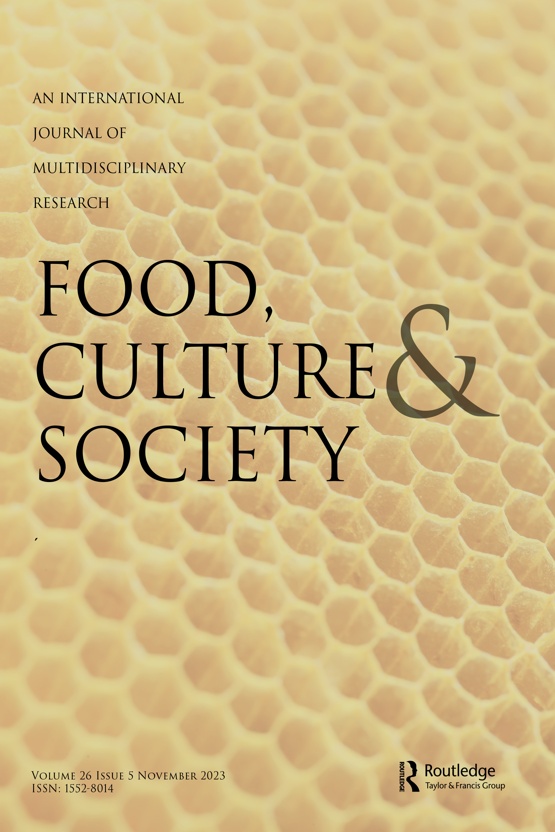Submit a Manuscript to the Journal
Food, Culture & Society
For a Special Issue on
The racialised, classed and gendered politics of food pedagogies
Abstract deadline
18 December 2023
Manuscript deadline
17 June 2024

Special Issue Editor(s)
Gurpinder Lalli,
University of Wolverhampton, UK
[email protected]
Elaine Swan,
University of Sussex
[email protected]
The racialised, classed and gendered politics of food pedagogies
Special issue editors
Gurpinder Singh Lalli, University of Wolverhampton
[email protected]
Elaine Swan, University of Sussex
[email protected]
This special themed section contributes to the growing body of research applying the ‘analytic lens’ of pedagogy to food (Watkins et al., 2015). We aim to foreground hierarchies of power, axes of social differentiation, and intersectional inequalities related to food education. Although scholars use terms such as food education, food learning, taste education, the broader concept of food pedagogies has been taken up to denote the ways in which cultural and social processes inside and outside of institutionalised education attempt to shape the feelings, thoughts, practices, embodiments and imaginings of children and adults in relation to food.
Food pedagogy has been defined as the teaching done by a range of agencies, actors, institutions and media about growing, provisioning, cooking, eating and wasting food (Flowers and Swan, 2015). Educators, or pedagogues, who seek to ‘educate’ about food, include food activists, farmers, food producers, sports and diet professionals, and community members, school-teachers and a growing litany of cultural intermediaries such as celebrity chefs, food writers, food bloggers, health practitioners and advertisers (Flowers and Swan, 2015; Park, Yeatman, Russell, & MacPhail 2022).
Examples of food pedagogical research include school classroom teaching on food health (Leahy and Pike, 2015a/b; Rich and Evans, 2016; Leahy and Wright, 2016); school and university teaching on environmental sustainability (Mitchell et al., 2017) and science (Medina-Jerez and Dura, 2020); school trips to farm shops (Earl, 2020); school lunch times (Lalli, 2019a; 2019b; 2020; 2021); school food policy (Earl and Lalli, 2020); school lunch boxes (Pluim et al., 2018); school lunches (Leahy et al., 2015a; Leahy et al., 2015b; Oncini, 2020); school gardens (Hayes-Conroy, 2014); university campus tours (Classens et al., 2021); food media including films (Gray et al., 2018, Rich, 2015); children’s cookbooks (Wessell and O’Brien (2011); and TV programmes such as Junior Masterchef (Schmeh, 2014); and teacher training (Bae, 2020). Examples of studies on food pedagogies and adults include Sumner (2013), Etmanski, (2015), Flowers and Swan (2015); Parsons (2015) and more specifically: home cooking (Janhonen et al., 2018); TV programmes (de Solier, 2013); chefs and cooks (Higgins-Desbiolles et al., 2014); community gardens (Hake, 2017); food exhibitions in museums (Swan et al, 2015); food social movements (Hayes-Conroy, 2014); leisure and tourism (Etmanski, 2015; Mair and Sumner, 2017; Flowers and Swan, 2019).
Some of this research problematises food related curricula for a lack of attention to structural inequalities and the experiences of racialised food workers (Yamashita and Robinson, 2016) and wider industrialised food systems (Sumner, 2013; Classens et al., 2021; Levkoe et al., 2020). Much of it critiques how food pedagogies reproduce hierarchies and inequalities of race, gender, class, and heteronormativity, especially around normative notions of food conduct, social distinction and middle-class whiteness (see for example, Fernández et al., 2021; Earl, 2020; Flowers and Swan, 2019). For example, Naya Jones (2019) stresses how Black young people are often the targets of food pedagogies which reproduce binaries of good and bad foods, and stigmatise their food lives. She argues for a Black embodied pedagogy of food politics. Julie Guthman (2008) problematises the pedagogies of privileged white middle-class do-gooders, who want to ‘educate’ those they feel do not understand how to eat properly. Feminist food scholars detail the intensive burden of food pedagogies based on ‘eco-nutritionism’ and ‘healthism’ on minoritised mothers and found across so many different domains from community initiatives, TV programmes and women’s magazines (Martin, 2018; Parker, 2020; Swan, 2021).
Current studies of food pedagogies across different spheres and sites contribute to our understanding of food curricula and processes, moralities, politics and social hierarchies of difference, but there is still much work to be done:
- First, the FCS journal’s focus on food studies pedagogy provides a forum to explore the specificities of what makes food, and food education ‘pedagogical’, a topic somewhat under-developed to date. How are the processes of formal and informal ‘teaching’ and ‘learning’ designed and performed specifically across different social spaces, relations and practices in relation to food (Watkins, et al., 2015)? How are they classed, gendered, racialised, heteronormative?
- Secondly, the relationship between the ‘pedagogical state’, its programmes, food citizenship and expectations for schooling and teachers can be deepened through attention to the materialities of food, embodiments and the senses, and how these target, support or stigmatise minoritised groups (Pykett, 2010; Earl, 2020; Flowers and Swan, 2019).
- Thirdly, much research on adult food pedagogies focuses on middle-class foodies but neglects the education and training of food pedagogy related to semi-professions such as nurses, mid-wives, fitness experts and dieticians, and community workers and volunteers.
- Fourthly, the politics of food pedagogies related to the cost-of-living crisis and Covid-19 have yet to be fully explored (Power et al, 2020; Swan, 2021).
- Finally, further work is needed on how food pedagogies offer resistance and sustenance, spaces for anti-racism, gendered and classed connectivity and environmental activism (Jones, 2019, Nettles-Barcon et al., 2015).
We welcome papers that are empirical, conceptual and/or theoretical in their focus which extend and deepen our understanding of food pedagogies and intersectional inequalities in different national, social and cultural contexts.
Looking to Publish your Research?
Find out how to publish your research open access with Taylor & Francis Group.
Choose open accessSubmission Instructions
Key dates:
Abstracts of 1000 words excluding references to be submitted to special issue editors by 18th Dec 2023
Informed if abstract accepted by 22nd Jan 2024
Full article between 8-10k submitted by 17th June 2024
Expected publication date October 2025